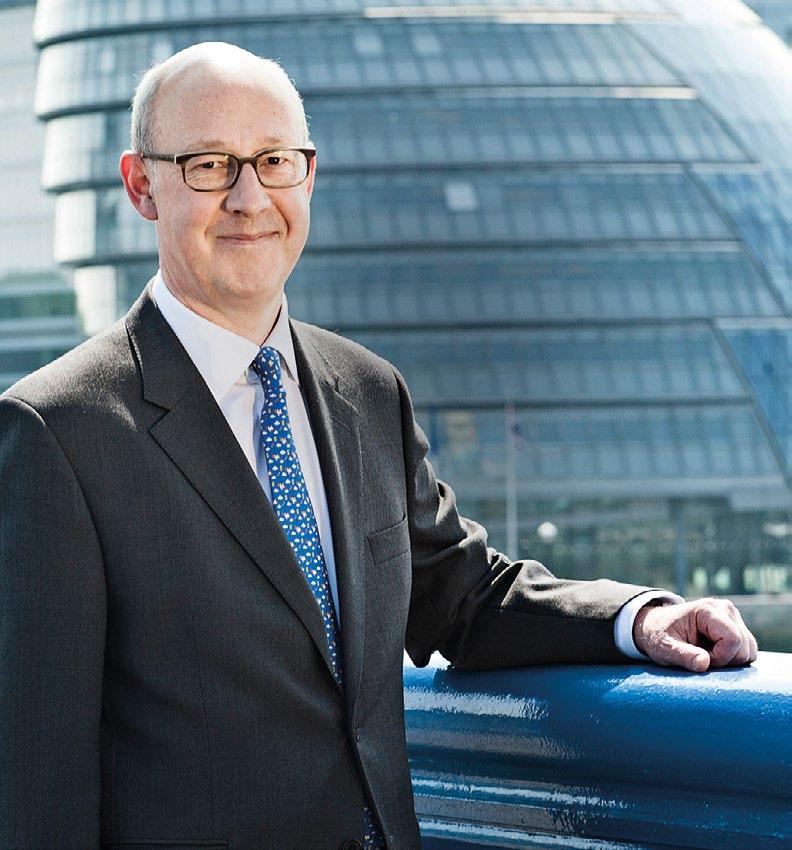
3 minute read
Don't drink the water and don't breathe the air
The Tom Lehrer song Pollution is one of the first songs the founder of Clean Air in London remembers. The lyrics are etched into Simon Birkett’s memory, perhaps subconsciously driving him on his chosen career path.
BY KATE ELIX
After supporting a local traffic campaign in London in the early 2000s, Simon Birkett (TC 1978) decided to start campaigning on something he felt even more strongly about – air pollution.
In 2005, Simon says there was no one campaigning assertively for clean air in the smoggy UK capital, so he wrote letters to the Lord Mayor of London and the European Commissioner for the Environment. It was bold for someone with very little experience in the field. But it paid off.
‘What was surprising was that because I was operating in a vacuum, whenever I asked people to do things, they just said, “Yes”.’
The encouragement he received was all the motivation Simon needed to press ahead. He created the Clean Air in London campaign, aiming to meet World Health Organisation (WHO) air quality guidelines across London (and elsewhere) by building public understanding of the issues and enforcing air quality laws.
Investigating the extent of London deaths from air pollution led to the discovery of shocking statistics that helped Simon’s campaign gain traction. He questioned then Lord Mayor Ken Livingstone’s assertion that 1031 Londoners died each year as a result of air pollution, and after pushing the government for answers, found the number of estimated annual deaths, in fact, to be more than 4000.

The smoggy London skyline
‘I put in a letter to one of the parliamentary select committees saying that the government had covered up or failed to publish this estimate for the number of deaths from long-term exposure to air pollution,’ he says.
‘And it turned out I was right. The government was forced to start publishing this number. Asking for the calculations and reports led to the discovery of some fairly extraordinary things.’
Among the many accolades bestowed upon the environmental activist was the label ‘force of nature’ by London’s Evening Standard, with Simon included among the newspaper’s ‘Progress 1000’ list of the most influential people in London every year from 2014 to 2019. But he feels the policy changes his campaign has prompted are more important than awards.
This includes influencing the environmental agenda across Europe. After the European Parliament, Council of Ministers and European Commission failed to agree on air quality legislation in the mid-2000s, Simon wrote to the European Commissioner for the Environment encouraging him to take the most ambitious position among the three groups. He did, and the legislation was enacted throughout Europe in 2008. ‘I felt I was playing a real part in that, and that was very exciting.’
Between 2015 and 2019, Simon assisted the United Nations as the only air pollution stakeholder on the UN Environment Program’s High Level Intergovernmental and Stakeholder Advisory Group, which was steering work on the UN’s most comprehensive report yet on the global environment.
Spending weekends and holidays on a five-acre plot on the Mornington Peninsula in Victoria, Simon says his love of the environment began at a young age – he was attuned to all things nature and spent many hours building dams and playing in treehouses. Following his father’s death in 1972, he moved to his mother’s homeland, the UK, returning to Australia to attend university five years later.
‘My first experiences of what I would call real critical thinking happened in Melbourne,’ says Simon, who completed a civil engineering degree while living at Trinity College, where he met some of his best friends to this day.
After graduating from Melbourne University with first-class honours, Simon was hired as the only graduate engineer with Consolidated Gold Fields Australia in 1982. He was concerned by evidence of poor environmental standards set by the company in Tasmania, and says he felt sympathy for the protesters he encountered there.
The job wasn’t meant to be, so he returned to London, completed an MBA at London Business School and began work in the financial services industry, where that early taste of activism set him on a fulfilling career path.
His hope now is that others, particularly young people, will stand up for their beliefs, just as he did. ‘I really think that we need young people today to shake things up because we can’t just let older people like myself, or anyone else, just gently ride off into the sunset.’










